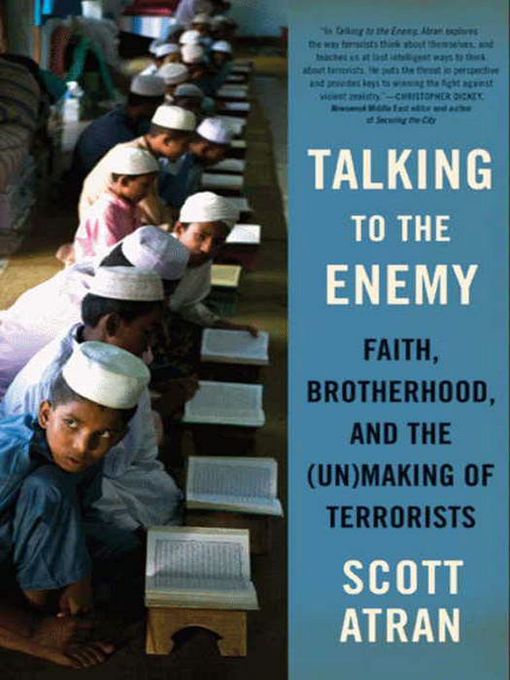
Talking to the Enemy
Faith, Brotherhood, and the (Un)Making of Terrorists
کتاب های مرتبط
- اطلاعات
- نقد و بررسی
- دیدگاه کاربران
نقد و بررسی

August 2, 2010
Atran (In Gods We Trust) examines the motivations of terrorists in this sprawling and timely study. Drawing upon years of travel among Muslim communities from Indonesia to Morocco, extensive interviews with “would-be martyrs and holy warriors,” and detailed surveys, the author concludes that young jihadists aren’t merely motivated by political or religious fervor—they are powerfully bound to each other, they were “campmates, school buddies, soccer pals, and the like, who become die-hard bands of brothers.” Besides the importance of group dynamics in spawning terrorists, the author highlights the role of “sacred values”—core cultural values—that ”often trump other values, particularly economic ones.” Within this context, Atran argues that the best measures against today’s terrorist threat—which is more opportunistic, “more scattered and disjointed,” than it was before 9/11—are soft-power initiatives “to provide alternative heroes and hopes” within Muslim communities and to reframe sacred values. Atran’s intellectual reach is prodigious; his analysis of the underpinnings of terrorism is instructive, if often unconventional; and his provocative prescriptions merit debate and consideration.

August 1, 2010
French-American anthropologist Atran (In God We Trust: The Evolutionary Landscape of Religion, 2002, etc.) travels widely interviewing terrorists and jihadists to uncover the driving force motivating religious violence.
Wildly ambitious and meandering, the book is at once frustratingly ill-focused, historically keen and astutely humanistic. The author has conducted tremendous fieldwork over the years, studying "tribal" groupings from Muslim fighters in Sulawesi, Indonesia, to suicide bombers in Palestine, and delving into the root of sacred beliefs. Jihad is not necessarily "nihilistic and immoral," as Americans tend to believe, with their "constant diet of individualism" and dislike of looking to group action for justification of behavior. Atran's studies show rather that "imagined kinship—the rhetoric and ritual of brotherhood, motherland, family, or friends and the like"—has sharpened the religious instinct with its expression in irrational and illogical belief. Curiously, the author discovered that five of the seven suicide bombers of the 2004 Madrid train attack—as well as various "Iraq-bound martyrs"—spent formative years growing up in an ancient Moroccan barrio of Tetuán called Jamaa Mezuak, where the vanquished Moors had retreated after the defeat of Grenada in 1492. Atran wonders if these Mezuak soccer buddies were still playing out after all these centuries a "triumphant resistance to Christian conquest." The author examines in vivid detail the kinship among the Madrid bombers, and, earlier, the October 2002 Bali bombings masterminded by Indonesian militants. He attempts to establish how a terrorist network is formed—by attending the same madrassah, living in the same village family, and so on. Atran also traveled to Pakistan to inquire about clan loyalties and the Taliban, and looks at how the availability of resources and the intense competition for them dictate social structures. Though often scattered, the author's deep penetration into anthropological explanations of evolution, teamwork, blood sport and war attempt to define what it means to be human—and he does an admirable job in the face of far-flung research.
Messy but revealing and passionate—enlightening for patient readers.
(COPYRIGHT (2010) KIRKUS REVIEWS/NIELSEN BUSINESS MEDIA, INC. ALL RIGHTS RESERVED.)

























دیدگاه کاربران